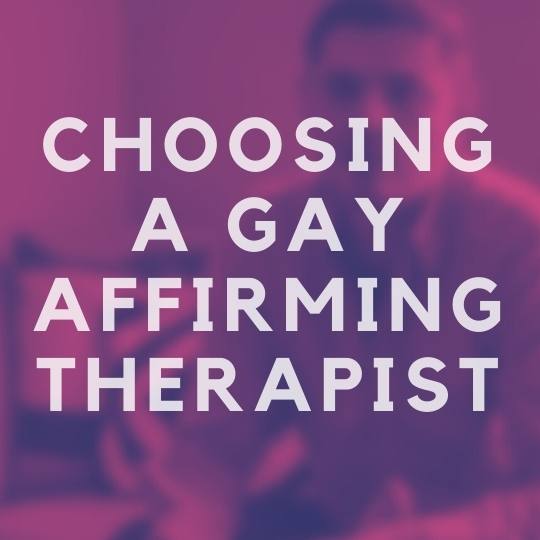Choosing a Gay-Friendly Counselor
Updated 2/28/22
When I originally wrote this article in 2011, the term “gay-friendly” was the mainstream way of labelling a therapist or professional who was open and comfortable with the gay community and gay individuals. However, as the decade evolved, so did the sense of what gay and lesbian individuals should look for in a therapist. I also learned a lot as well as I move to a bigger city and networked with several colleagues.
The term that most of us look for now is “gay-affirming therapist.” The difference really comes down to how comfortable you as the client feels with your therapist, rather than how the therapist feels. This may not sound like a major difference on the surface, but it’s actually very important. Research shows that there are therapists who think of themselves as competent to work with groups of individuals, but overestimate their abilities to empathize, understand, and give support.
Making an Important Choice
Choosing a counselor is a difficult task for anyone, but choosing a counselor with whom you’re comfortable discussing gay-related issues can even further complicate this decision. Many counselors claim to be comfortable in discussing these issues, and in fact, they likely are. That is not what defines gay-affirming counseling, however. Professionals aren’t the ones who get to define this for you. You, as the one seeking help, has to decide what makes a counselor gay-affirming.
To determine whether or not a therapist is one who you can feel comfortable with, you should consider asking many questions. It is appropriate under these circumstances to ask the therapist if he/she identifies as part of the community. If the therapist is not, you can also ask if they have had any training or experience working with the LGBT population. Not all affirming therapists are part of the community. Many allies are very affirming to gay clients. Most educational programs offer some cultural competency training that includes LGBT issues, but this training is often minimal at best. Therefore, it is also appropriate to ask the therapist about their experience.
Then it is important to gauge you own level of comfort. You can set up a consultation to meet this professional, and see how comfortable you feel. Do you feel that this is someone who you can talk openly about your relationship with? Is this someone who you think will understand the discrimination and life-circumstances that you might discuss?
It’s OK to want someone who is affirming even when the primary issue isn’t your sexual orientation.
Many times gay clients come to counseling for issues that are not at all related to being gay. There are other times that current issues are indirectly related to being gay or lesbian. Then there are times when a person’s problems with depression, anxiety, or substance abuse are directly related to discomfort from the fear that is related to coming out, being ridiculed, or lacking acceptance. If you have not yet come out or are questioning whether or not you are gay, you are more likely to feel some level of discomfort discussing this openly with a person who you don’t yet know very well. Part of this process is becoming more comfortable with this part of your life, which in part is what therapy can help you with.
In a setting that is gay-affirming, you should be able to openly discuss topics such as improving on your sexual relationship, considerations of having open relationships, how to deal with discrimination, accept yourself with or without the acceptance of others, and how to overcome religious trauma. These topics are not always easy for clients to discuss, and it is important that you feel as comfortable as possible in talking about these things. A counselor or therapist who understands these issues can give you open feedback, but in a way that you will feel that the environment is safe for you as well.
Keep in mind that it is up to you to determine what is and is not “gay-affirming”. Many times professionals will say that they are gay-affimring, without recognizing their own biases. Everyone has biases, and a counselor who is competent to help with gay-related issues will recognize his own. You may seek seek out a gay therapist, or you may find someone who is not gay, but with whom you feel comfortable talking to. Either way, follow your gut, and you’ll be on the path to self-acceptance and determination.
Obviously being gay can impact your life in a variety of ways. Then there are also just the day-to-day human things that you may want help for. Work related stress, life changes, major life events, and relationship issues can all lead people to therapy. Some want to discuss these things with an affirming therapist as well.
If you are in the Dallas area, and looking for a gay therapist or counselor, contact us now to see how I can help you with anxiety, depression, relationship problems, and substance abuse issues.







